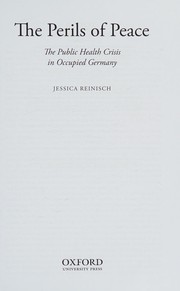- Summary
- At the end of the war in 1945 Germany was a country with no government, little functioning infrastructure, millions of refugees and homeless people, and huge foreign armies living largely off the land. Large parts of the country were covered in rubble with no clean drinking water, electricity, or gas. Hospitals overflowed with patients but were short of beds, medicines, and medical personnel. In these conditions the potential for epidemics and public health disasters was severe. In The Perils of Peace Jessica Reinisch considers how the four occupiers--Britain, France, the Soviet Union, and the United States--attempted to keep their own troops and the ex-enemy population alive. While the war was still being fought, German public health was a secondary consideration for them: an unaffordable and undeserved luxury. But once fighting ceased and the occupation began, it rapidly turned into an urgent priority. Public health was then recognized as an indispensable component of creating order, keeping the population governable, and facilitating the reconstruction of German society. But they faced a number of problems in the process. Which Germans could be trusted to work with the occupiers and how were they to be identified? Who could be tolerated because of a lack of alternatives? How, if at all, could former Nazis be reformed and reintegrated into German society? What was the purpose of the occupation in the first place? This is the first carefully researched comparison of the four occupation zones which looks at the occupation through the prism of public health, an essential service fundamentally shaped by political and economic criteria, and which in turn was to determine the success or failure of the occupation.
- Format
- Book
- Author/Creator
- Reinisch, Jessica.
- Published
- Oxford : Oxford University Press, 2013
- Locale
- Germany
- Contents
-
1. Introduction
2. A hard peace? Allied preparations for the occupation of Germany, 1943-1945
3. 'Can we distinguish the sheep from the wolves?': Émigrés, allies, and the reconstruction of Germany
4. 'Now, back to our Virchow': German medical and political traditions in post-war Berlin
5. Public health work in the British Occupation Zone
6. Public health work in the American Occupation Zone
7. Public health work in the Soviet Occupation Zone
8. The forgotten zone: public health work in the French Occupation Zone
9. Some conclusions
Bibliography
Index.
- Notes
-
Includes bibliographical references and index.
1. Introduction -- 2. A hard peace? Allied preparations for the occupation of Germany, 1943-1945 -- 3. 'Can we distinguish the sheep from the wolves?': Émigrés, allies, and the reconstruction of Germany -- 4. 'Now, back to our Virchow': German medical and political traditions in post-war Berlin -- 5. Public health work in the British Occupation Zone -- 6. Public health work in the American Occupation Zone -- 7. Public health work in the Soviet Occupation Zone -- 8. The forgotten zone: public health work in the French Occupation Zone -- 9. Some conclusions -- Bibliography -- Index.




